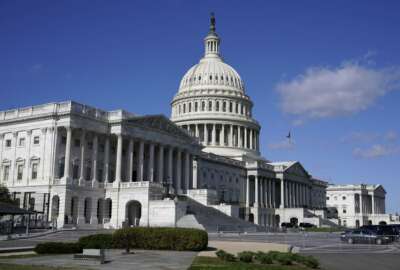If there is a 2022 budget framework, let’s hope it holds up
It's up to the Senate now to vote on a way to avoid a lapse in appropriations Friday, when the current continuing resolution ends. It's not exactly a route to full...
Best listening experience is on Chrome, Firefox or Safari. Subscribe to Federal Drive’s daily audio interviews on Apple Podcasts or PodcastOne.
It’s up to the Senate now to vote on a way to avoid a lapse in appropriations Friday, when the current continuing resolution ends. It’s not exactly a route to full 2022 appropriations, but its not disaster. The Federal Drive with Tom Temin got the latest from WTOP’s Capitol Hill Correspondent Mitchell Miller.
Interview transcript:
Tom Temin: Let’s start with a definition of what they mean by budget framework. Because frameworks can collapse.
Mitchell Miller: Exactly. And it still could collapse. And it’s very tenuous at this point. You know, we’re only four months into the fiscal year, after all, and we actually may soon have a budget for the fiscal year that began way back in October. But right now, it’s still a little bit unclear about, more than a little bit unclear about what this actually means. The appropriators on the House and Senate side were very coy last week when they said yes, we have this tentative agreement, but they really wouldn’t go into any details about what it included. There was some talk about the fact that it will include so-called parity between defense spending and non-defense spending. But other than that, there’s a lot more we need to learn about this. But it does buy them some more time, as we get through with this continuing resolution. Or I should say, the continuing resolution buys them more time of the House passing it last week. So no threat of a government shutdown this Friday, when money was to run out with the CR expected to be extended through March 11. The Senate is likely to vote on that this week.
Tom Temin: Got it. So maybe by the cherry blossoms or something, they’ll have something together.
Mitchell Miller: Right.
Tom Temin: What happens once they pass, if they pass this latest CR, that still only gives them three weeks to do the hard work?
Mitchell Miller: Right. And there’s still a lot of nervousness, frankly, among lawmakers. One of the people that’s kind of nervous about this is Virginia Senator Mark Warner, who wrote to the Office of Management and Budget last week, saying, look, this better come together or a lot of states are going to lose money in connection with the infrastructure funding that is kind of front loaded into this spending plan. And he pointed out that just in Virginia alone, the state could lose more than $350 million for roads and bridges, and more than $50 million in transit funding if this doesn’t get approved. And then, as we’ve talked about in the past, there’s concern among Defense officials that if it doesn’t get approved that a lot of these big programs for training and for weapon systems could also be held up. So there’s still a lot of concern about what’s actually going to happen, even though there was a little bit of a mini celebration last week when the appropriators said yes, we have this general framework.
Tom Temin: Yeah. So more a crack in the ice, if you will, then just the flowing of the dollars just yet.
Mitchell Miller: Exactly.
Tom Temin: All right. And I wanted to ask you about Rep. Connolly of Northern Virginia. He has a large interest had a hearing last week on Metro and some of the safety issues. But there’s another issue with Metro that is coming near, I guess of concern to the Hill, and that is the lack of federal bulk ridership. You know, the people going to work on Metro is just not materializing yet.
Mitchell Miller: Right. And you know, here we are, we’re on the cusp, perhaps of maybe a little bit of the proverbial light at the end of the tunnel in connection with the pandemic. But for Metro that tunnel is very, very long right now, because at this hearing last week that Gerry Connolly presided over, they noted that normally, you would get close to 40% of Metro’s ridership during the week from federal workers and they’re nowhere close to that right now. In fact, the Metro general manager, Paul Wiedefeld, said that they are down 70% from pre pandemic levels. So you can imagine what that’s doing to the revenues for Metro and they really need more of these federal workers to get back on the rails and getting back into their offices. And it’s just not happening right now. So that’s a huge fiscal challenge for Metro. They are getting a little bit of increased ridership on the weekends and and some of the off hours, but that doesn’t even come close to replenishing the money that they’ve lost during the pandemic from the loss of federal employees.
Tom Temin: Right, and it could be another month or so, I think, the end of March is when agencies, the earliest ones are thinking about some sort of mass return to the office. And of course, that’s optional. And it still gives another six weeks of low revenue.
Mitchell Miller: Right. And then the other issue is, as you know, Metro is not running at full speed right now because of the derailment that happened last fall. And they’re still reviewing safety issues in connection with the wheels on these 7000 Series rail cars. And so even those people that are riding Metro right now are finding themselves waiting on station platforms for very long periods of time. And Metro officials at this hearing last week acknowledged that really, at the earliest that’s going to get closer to back to normal is maybe in April, but again, there could be delays with that. And when you have federal workers potentially going back to the office, you know, they’re going to be trying to figure out well, how am I going to get back to the office? What if I can’t work rely on Metro to get there in a timely fashion? I was talking to somebody the other day who was just trying to get to the Capitol and they said from one day to the other, it can vary by 30 to 45 minutes. So that makes a big difference when you’re commuting every morning and afternoon.
Tom Temin: Sure, and that intersection of Florida Avenue, New York Avenue and First Street Northeast is still years yet from being fixed.
Mitchell Miller: Right.
Tom Temin: Don’t try to drive that way. We’re speaking with Mitchell Miller, WTOP’s Capitol Hill correspondent. And if all rails lead to Gerry Connolly, so do a lot of other roads. And his hearing on the postal issue of Postal Service delivery is coming up. And that’s as Congress considers a reform bill, that could help the Postal Service financially.
Mitchell Miller: A lot of issues coming up related to the Postal Service, Congressman Connolly today is actually holding a field hearing in Baltimore. And this relates to delivery issues. They have done several reviews showing that the Baltimore area actually has some of the worst delivery service in the country. Just one example. First Class delivery, which is supposed to get to its destination within three to five days, it’s only arriving in the Baltimore area close to 60% of the time, so 40% of the time, you’re likely not to get whatever you want delivered on time, at least through first class delivery. And there have been also problems in the closer-in suburbs here around Washington.
There is some bright news for the Postal Service with this big reform bill that was passed last week by the House and looks like it’s moving forward. As you know, the Postal Service has had major problems with red ink, going back well over a decade, just not being able to pay for itself. And of course, the big reason for that is unlike many other agencies, it has to pay for its retirement funding and health care upfront. And so this completely changes the funding related to the Postal Service, it’s estimated that alone could save the Postal Service over $20 billion over the next decade. And then there are a variety of other areas where they believe that billions of additional dollars will or will be saved. And then as far, and part of that is requiring that Postal Service employees enroll in Medicare, that would cut down on the premium costs. Currently, only about a quarter of retired postal workers actually don’t enroll in Medicare, even though they’re eligible. So that’s a big area of potential savings. And then just for the average person who wonders, well, what’s this mean for my mail service, they are planning under this legislation to continue six day a week service. And then the other big thing is they are going to create an online dashboard, which you will be able to supposedly look at and find out how well your service area, if you live in Baltimore or somewhere else, how well it’s actually doing compared to other parts of the country. So they’re trying to increase the transparency of the Postal Service.
Tom Temin: So you could find out whether that Christmas card your grandmother mailed in 1957 will actually be on the way.
Mitchell Miller: Exactly.
Tom Temin: They said, yeah, it’ll be there Tuesday. And just another issue. Congress has been looking at the Washington Commanders, because the as I recall, they were not in the Super Bowl yesterday. The sexual harassment issue, how does that come before the august body of the Congress, the United States.
Mitchell Miller: Right, a lot of people wonder what is Congress doing investigating the Washington commanders, formerly the Washington Football Team. And it all comes down to workplace issues, as has been documented by the Washington Post and others, there have been major issues in connection with sexual harassment. A lot of issues with women being mistreated within the organization. And so the House Oversight and Reform Committee decided to take the bull by the horns on this issue, and held a hearing last week, which included it wasn’t actually a full blown hearing, it was actually technically a roundtable. So the witnesses were not under oath. But basically, they outlined a lot of these problems. And so now what the House Oversight Committee is trying to do is get the NFL to open up about this investigation that was done in connection with the team because they never actually revealed what was in the report related to the team. We heard a lot of reports in the media about what was in it, but they never actually issued it. And that’s because the report was, oddly enough done in a verbal fashion with the NFL top office. So there’s been a lot of pressure for members of Congress to say, look, we need a lot of transparency on these workplace issues. And then complicating things even more. At this hearing, there was an allegation specifically made against owner Dan Snyder by one of the former employees. That has also set off another mini drama in connection with the NFL and this committee, which really wants to get a lot of the documents related to the investigation.
Believe it or not, there are more than 100,000 outstanding documents in connection with this investigation. The committee is pushing the NFL to release them. The NFL, in turn says, well, we can’t release them because of this complicated legal agreement related to the team and the team actually has to release it. So a lot of big items related to this soap opera involving Washington Commanders, obviously, they have a lot of issues on the field as well, a long way from the Super Bowl for sure. But this is going to be an issue that is going to continue, I think, because you’ll recall that going back to issues with Major League Baseball and steroid use, people sometimes forget that Congress actually has the power to move forward these issues which will otherwise lie dormant because the leagues don’t really want the bad publicity.
Tom Temin: Well, if you want to take down the team and get those papers, don’t grab that bull by the horns necessarily.
Mitchell Miller: No, that’s true. You don’t want to do that.
Copyright © 2025 Federal News Network. All rights reserved. This website is not intended for users located within the European Economic Area.
Tom Temin is host of the Federal Drive and has been providing insight on federal technology and management issues for more than 30 years.
Follow @tteminWFED






